Unit 3 Computers Learning about Language 课件(34张PPT)
文档属性
| 名称 | Unit 3 Computers Learning about Language 课件(34张PPT) |
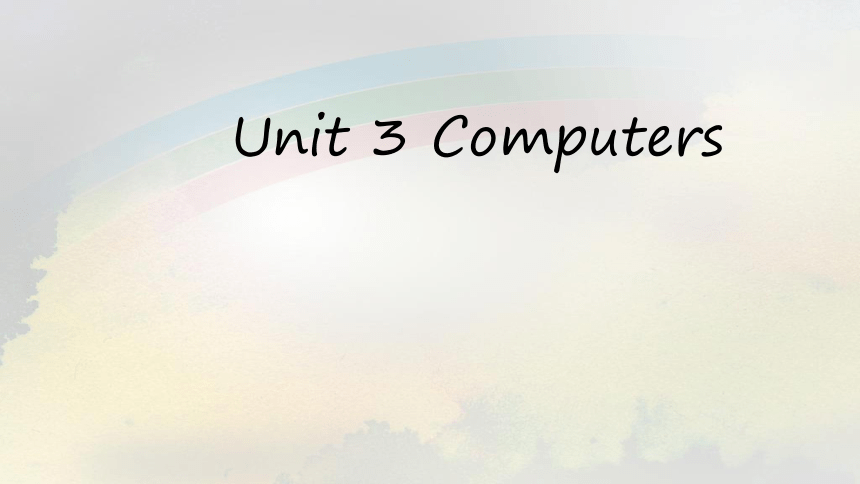
|
|
| 格式 | zip | ||
| 文件大小 | 4.5MB | ||
| 资源类型 | 教案 | ||
| 版本资源 | 人教版(新课程标准) | ||
| 科目 | 英语 | ||
| 更新时间 | 2020-04-22 16:01:50 | ||
图片预览

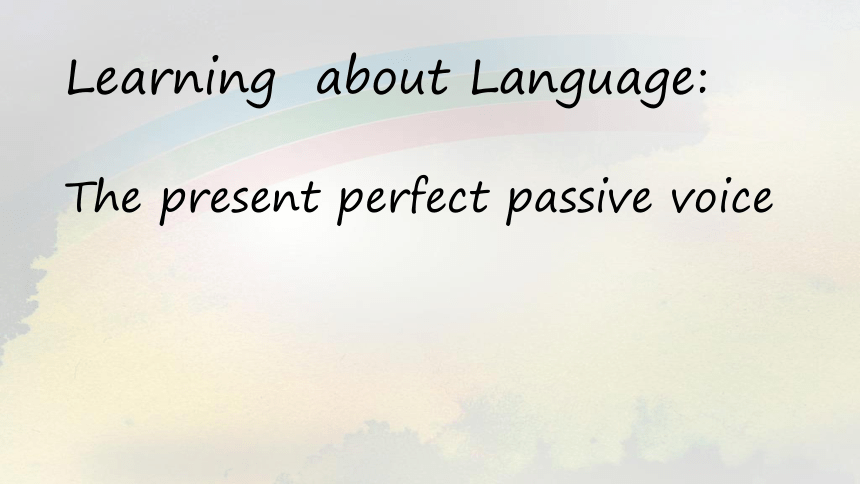
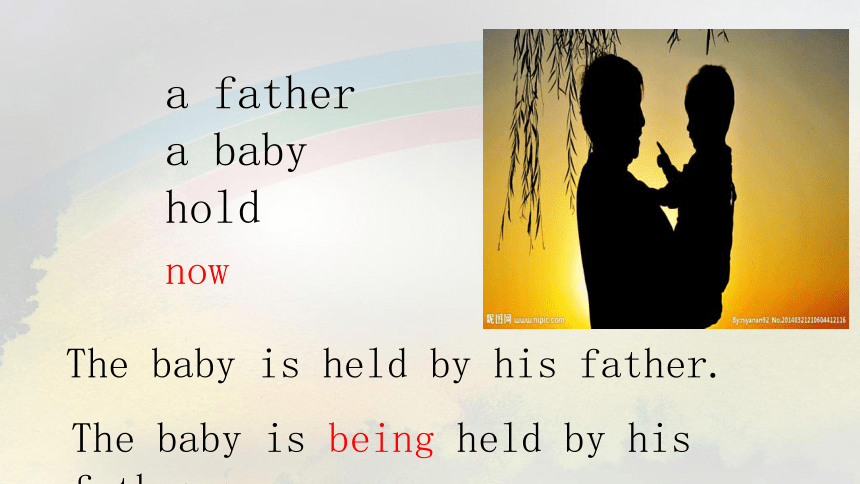
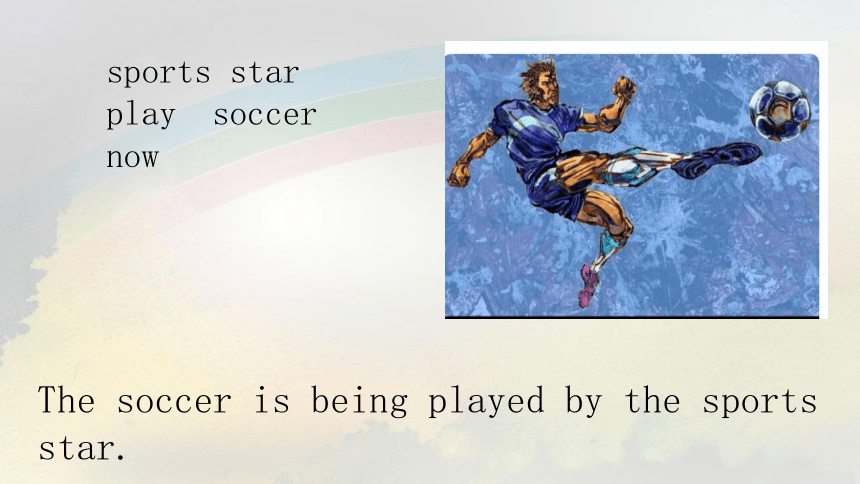
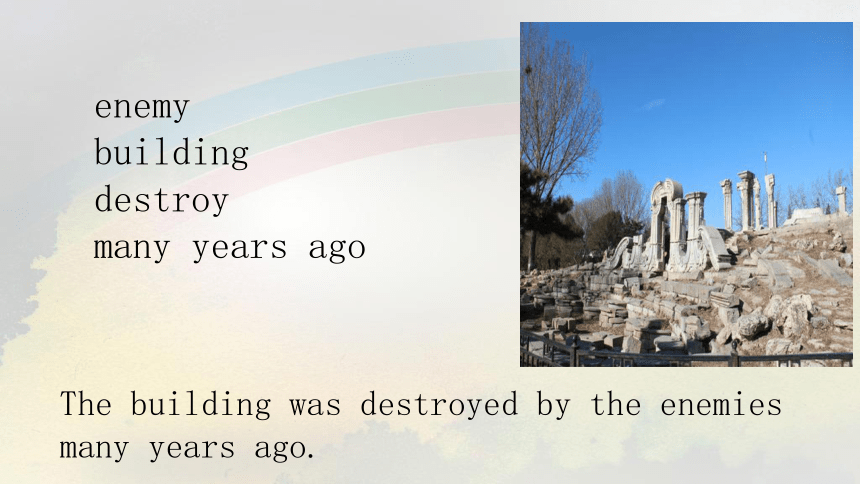
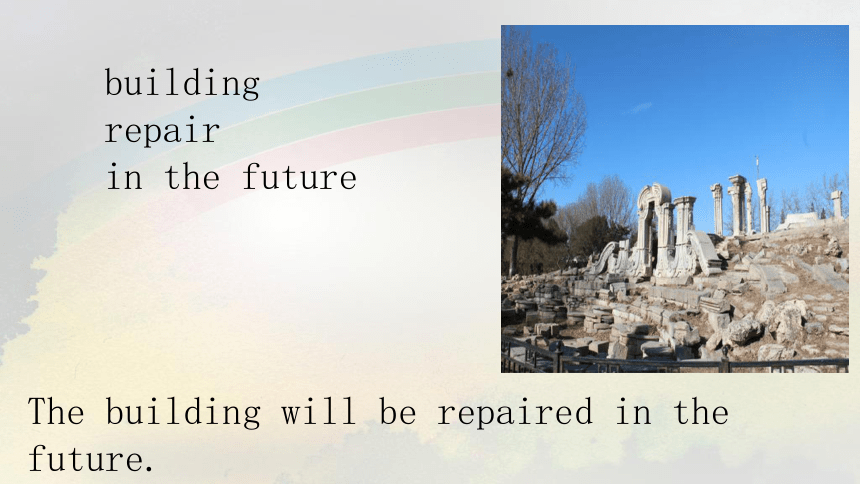
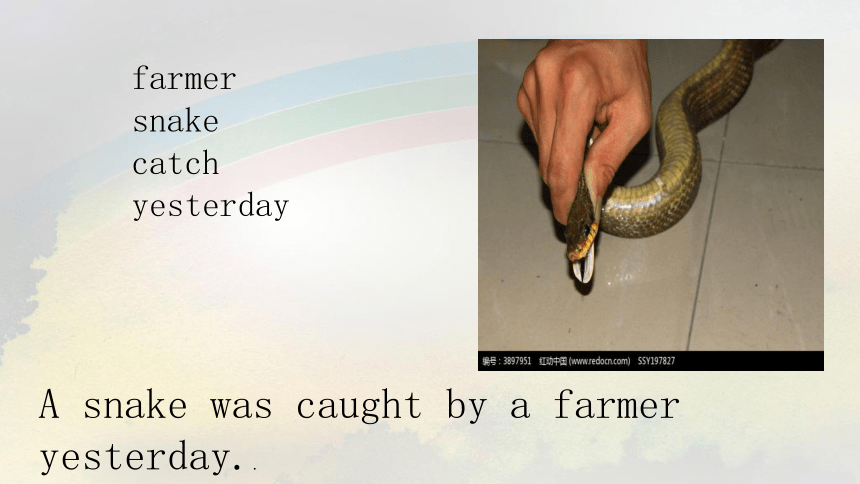
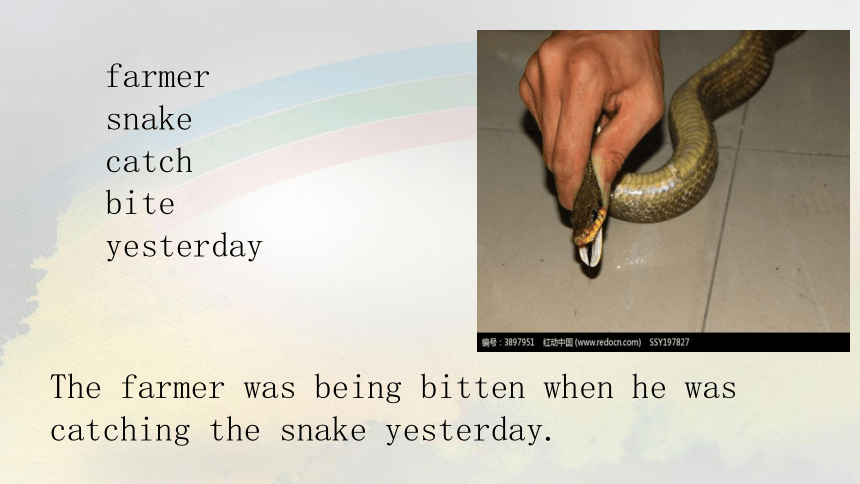
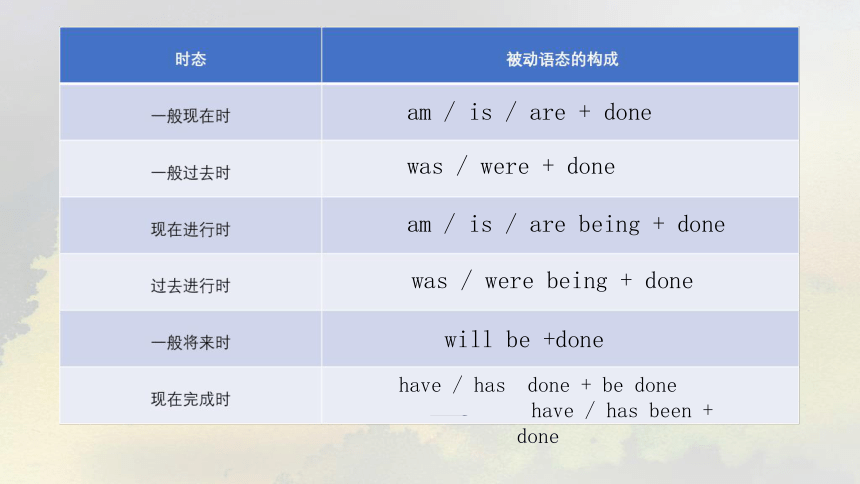
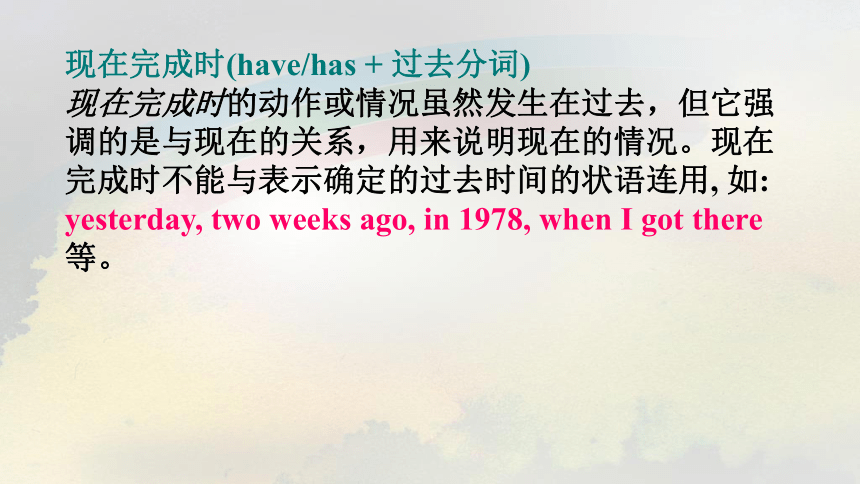
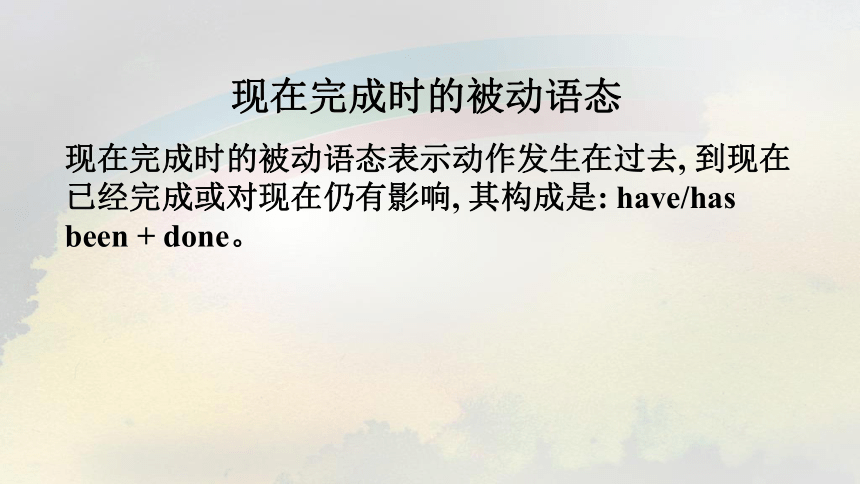
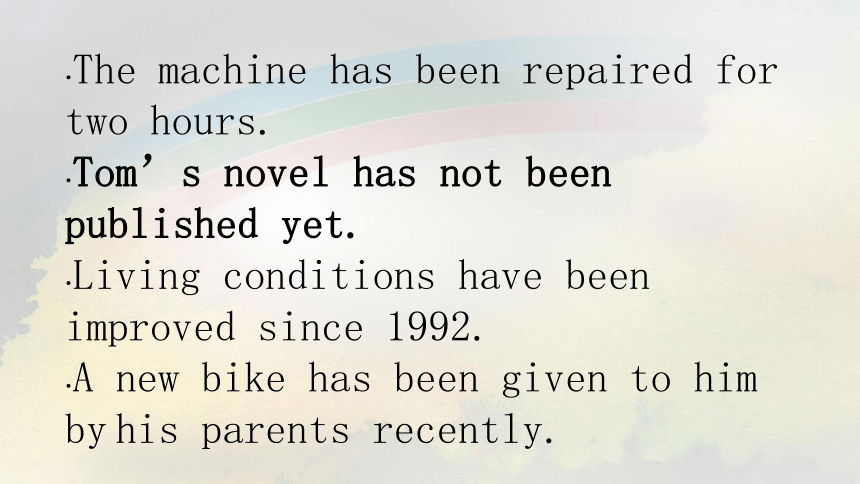
文档简介
(共34张PPT)
Unit 3 Computers
Learning about Language:
The present perfect passive voice
a father
a baby
hold
The baby is held by his father.
now
The baby is being held by his father now.
sports star
play soccer
now
The soccer is being played by the sports star.
enemy
building
destroy
many years ago
The building was destroyed by the enemies many years ago.
building
repair
in the future
The building will be repaired in the future.
farmer
snake
catch
yesterday
A snake was caught by a farmer yesterday..
farmer
snake
catch
bite
yesterday
The farmer was being bitten when he was catching the snake yesterday.
am / is / are + done
was / were + done
am / is / are being + done
was / were being + done
will be +done
have / has done + be done
have / has been + done
现在完成时(have/has + 过去分词)
现在完成时的动作或情况虽然发生在过去,但它强调的是与现在的关系,用来说明现在的情况。现在完成时不能与表示确定的过去时间的状语连用, 如: yesterday, two weeks ago, in 1978, when I got there等。
现在完成时的被动语态
现在完成时的被动语态表示动作发生在过去, 到现在已经完成或对现在仍有影响, 其构成是: have/has been + done。
?The machine has been repaired for two hours.
?Tom’s novel has not been published yet.
?Living conditions have been improved since 1992.
?A new bike has been given to him by his parents recently.
?The machine has been repaired for two hours.
?Tom’s novel has not been punished yet.
?Living conditions have been improved since 1992.
?A new bike has been given to him by his parents recently.
现在完成时常与already, always, often, ever, never, yet, not...yet, just等不表示明确的时间副词连用, 还可以和表示时间一直延续到目前的带since, for的状语及包括现在在内的词连用。如: now, today, this month, this year, recently, these few days等。
现在完成时态被动语态的特点:
1. 主语是行为动作的承受者。
e.g. The Temple of Zhang Fei has
been rebuilt.
张飞庙已经过重建。
2. 说话时已经完成的动作或出现的结果。
e.g. The door has been locked.
门已经被锁上了。
3. 动作或状态始于过去, 持续到现在, 并可
能持续下去。
e.g. He has been told about it for many
times. 有人告诉他这事很多次了。
(可能还会有人告诉他)
副词的位置
often, usually, always, never, hardly, seldom等副词置于have/has和been中间。
如: [误] Such a man has been hardly
believed.
[正] Such a man has hardly been
believed.
1. In the last few years thousands of films _____ all over the world.
A. have produced
B. have been produced
C. are producing
D. are being produced
B
2. Every year many farmers arrive in Shenzhen for the money-making jobs they _____ before leaving their hometowns.
A.promised
B. were promised
C. have promised
D. have been promised
D
3. His sister left home in 2015, and _____ since.
A. had not been heard of
B. has not been heard of
C. had not heard of
D. has not heard of
B
4. I like these English songs and they _____ many times on the radio. (安徽2008)
A. taught B. have taught
C. are taught D. have been taught
D
5. Though we don’t know what was discussed, yet we can feel the topic _____.
A. had changed B. will change
C. was changed D. has been changed
D
6. I got caught in the rain and my suit _________.
A. has ruined
B. had ruined
C. has been ruined
D. had been ruined
C
用被动语态改写下列句子。
They have finished the construction of the new railway lines by now.
The construction of the new railway lines has been finished by them by now.
2. We have built a new library in our school this year.
A new library has been built in our school this year by us.
3. The car factory has produced a great
many fine cars since the technological revolution.
A great many fine cars have been produced by the car factory since the technological revolution.
4. They have made a plan to help the poor
children in the poor area.
A plan has been made by them to help the poor children in the poor area.
5. The government has spent a lot of money on the Hope Project.
A lot of money has been spent on the Hope Project by the government.
Underline the use of the present perfect voice in the following poem. Then fill in the chart below.
Look at the way your face has been washed
Look at the way your hair has been combed
Look at the way your shoes have been cleaned
You’d better do them again.
Look at the way the flowers have been planted
Look at the way the grass has been cut
Look at the way the paths have been swept
I hope that you’ll come here again.
Read this poem aloud, paying attention to the rhythm and intonation. Then write your own poem.
Look at the way ______________________
Look at the way ______________________
Look at the way ______________________
_________________________
the table has been laid
the glasses have been placed
the food has been cooked
You’d better do them again.
Summary:
?Use your own words to express what you have learnt in this class.
Homework:
Use the present perfect passive voice to make sentences.
Unit 3 Computers
Learning about Language:
The present perfect passive voice
a father
a baby
hold
The baby is held by his father.
now
The baby is being held by his father now.
sports star
play soccer
now
The soccer is being played by the sports star.
enemy
building
destroy
many years ago
The building was destroyed by the enemies many years ago.
building
repair
in the future
The building will be repaired in the future.
farmer
snake
catch
yesterday
A snake was caught by a farmer yesterday..
farmer
snake
catch
bite
yesterday
The farmer was being bitten when he was catching the snake yesterday.
am / is / are + done
was / were + done
am / is / are being + done
was / were being + done
will be +done
have / has done + be done
have / has been + done
现在完成时(have/has + 过去分词)
现在完成时的动作或情况虽然发生在过去,但它强调的是与现在的关系,用来说明现在的情况。现在完成时不能与表示确定的过去时间的状语连用, 如: yesterday, two weeks ago, in 1978, when I got there等。
现在完成时的被动语态
现在完成时的被动语态表示动作发生在过去, 到现在已经完成或对现在仍有影响, 其构成是: have/has been + done。
?The machine has been repaired for two hours.
?Tom’s novel has not been published yet.
?Living conditions have been improved since 1992.
?A new bike has been given to him by his parents recently.
?The machine has been repaired for two hours.
?Tom’s novel has not been punished yet.
?Living conditions have been improved since 1992.
?A new bike has been given to him by his parents recently.
现在完成时常与already, always, often, ever, never, yet, not...yet, just等不表示明确的时间副词连用, 还可以和表示时间一直延续到目前的带since, for的状语及包括现在在内的词连用。如: now, today, this month, this year, recently, these few days等。
现在完成时态被动语态的特点:
1. 主语是行为动作的承受者。
e.g. The Temple of Zhang Fei has
been rebuilt.
张飞庙已经过重建。
2. 说话时已经完成的动作或出现的结果。
e.g. The door has been locked.
门已经被锁上了。
3. 动作或状态始于过去, 持续到现在, 并可
能持续下去。
e.g. He has been told about it for many
times. 有人告诉他这事很多次了。
(可能还会有人告诉他)
副词的位置
often, usually, always, never, hardly, seldom等副词置于have/has和been中间。
如: [误] Such a man has been hardly
believed.
[正] Such a man has hardly been
believed.
1. In the last few years thousands of films _____ all over the world.
A. have produced
B. have been produced
C. are producing
D. are being produced
B
2. Every year many farmers arrive in Shenzhen for the money-making jobs they _____ before leaving their hometowns.
A.promised
B. were promised
C. have promised
D. have been promised
D
3. His sister left home in 2015, and _____ since.
A. had not been heard of
B. has not been heard of
C. had not heard of
D. has not heard of
B
4. I like these English songs and they _____ many times on the radio. (安徽2008)
A. taught B. have taught
C. are taught D. have been taught
D
5. Though we don’t know what was discussed, yet we can feel the topic _____.
A. had changed B. will change
C. was changed D. has been changed
D
6. I got caught in the rain and my suit _________.
A. has ruined
B. had ruined
C. has been ruined
D. had been ruined
C
用被动语态改写下列句子。
They have finished the construction of the new railway lines by now.
The construction of the new railway lines has been finished by them by now.
2. We have built a new library in our school this year.
A new library has been built in our school this year by us.
3. The car factory has produced a great
many fine cars since the technological revolution.
A great many fine cars have been produced by the car factory since the technological revolution.
4. They have made a plan to help the poor
children in the poor area.
A plan has been made by them to help the poor children in the poor area.
5. The government has spent a lot of money on the Hope Project.
A lot of money has been spent on the Hope Project by the government.
Underline the use of the present perfect voice in the following poem. Then fill in the chart below.
Look at the way your face has been washed
Look at the way your hair has been combed
Look at the way your shoes have been cleaned
You’d better do them again.
Look at the way the flowers have been planted
Look at the way the grass has been cut
Look at the way the paths have been swept
I hope that you’ll come here again.
Read this poem aloud, paying attention to the rhythm and intonation. Then write your own poem.
Look at the way ______________________
Look at the way ______________________
Look at the way ______________________
_________________________
the table has been laid
the glasses have been placed
the food has been cooked
You’d better do them again.
Summary:
?Use your own words to express what you have learnt in this class.
Homework:
Use the present perfect passive voice to make sentences.
